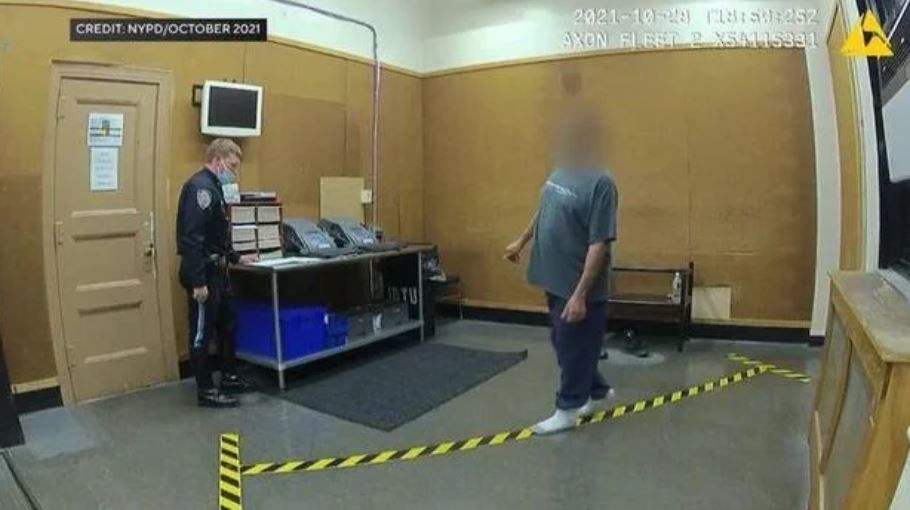Loophole in New York drugged driving law remains open, frustrating police and victims

The driver who struck a police officer in Brooklyn was given sobriety tests by police officers.
Click here for updates on this story
NEW YORK (WCBS/WLNY) — For months, CBS News New York Investigates has shared stories of New Yorkers whose lives have been altered by impaired drivers that, at times, the state wouldn’t prosecute.
The push for action to close a dangerous loophole in the law continues.
Drugged driver ended an NYPD officer’s career
Back in October 2021, an officer was investigating a crash between a car and a truck in Brooklyn when he was hit by a truck. His legs were crushed and he was heard on video requesting help.
“Call me a bus. I’m all right. Call me a bus,” he said, adding later, “Somebody help me sit up.”
“God, I thought he moved his car,” the visibly alarmed truck driver said.
As the injured officer was rushed to the hospital, police administered a field sobriety test. The truck driver was instructed what to do, but had trouble keeping his balance.
The loophole in New York
To charge an impaired driver in New York, police must name the exact drug ingested, and confirm it’s on a pre-existing list, created by lawmakers. If they can’t, law enforcement says alleged drugged drivers are off the hook.
Last year, the chair of the National Transportation Safety Board told CBS News New York Investigates that only four states have that loophole. The chair, the victims of drugged drivers, and law enforcement all say New York must close it.
“If you see impairment roadside, and you can’t name that drug, the current law wants you to let that person go,” said NYPD Det. Timothy Kessler, the department’s citywide DWI coordinator.
Kessler has trained tens of thousands to detect drugged drivers. He says after the officer was hit by the truck driver in Brooklyn he had to retire.
“It was very difficult. I mean, this was a young officer, started his career. Just to see somebody so reckless, somebody that’s done it before,” Kessler said.
Back in 2015, that same truck driver got a field sobriety test after a crash in Queens. Kessler said the driver hit and killed a bicyclist while high.
“An experienced drug user knows these issues and these problems that law enforcement faces, so they lie to us,” Kessler said.
To pin down the drug the driver allegedly took in the 2021 incident, Kessler said police conducted additional tests and were only able to charge the driver by chance.
“He was only admitting to his prescription medications, leaving out the illicit drugs that he was taking,” Kessler said. “Since one of those drugs was on the list, we were able to ultimately charge him.”
That truck driver was eventually convicted of driving while impaired by drugs, second offense. Currently, he’s serving his sentence in Brooklyn, and he could be released by the end of the year. The driver was also sentenced to 1 1/2 to 3 years in the 2015 case, where the bicyclist was killed.
Investigates has been after top N.Y. lawmakers for months
CBS News New York Investigates repeatedly asked Gov. Kathy Hochul’s office if she wanted to revise the law, but it would only say public safety was her top concern, “…which is why she’s taken action to stop car thefts and crack down on ‘ghost vehicles.'”
To get a clarification on her stance, CBS News New York Investigates caught up with the governor after an unrelated press conference earlier this month.
“Do you want to close this loophole? Is this a priority for you? Or is there a reason to leave the loophole open?” reporter Mahsa Saeidi asked.
“No, I don’t think we should have a loophole that allows people who are under the influence to get behind the wheel. Do not believe that,” Hochul said. “But the governor needs the Legislature to act as well.
“Sometimes, it takes a few times to get it right, but we’ve not ignored that issue because it’s critically important,” she added.
“This loophole has been in place for 20 years. Is this a priority for you this upcoming legislative session?,” Saeidi asked.
“I’ll continue to focus on it. We’ll work the hardest we can with the Legislature to get it finished,” Hochul said.
Many drugs aren’t being tested for, Kessler says
Two weeks later, in her State of the State address, the governor made no mention of strengthening drugged driving laws. However, in the corresponding book, on page 45, it states the governor “will propose legislation to close critical loopholes, such as expanding the universe of prosecutable substances.”
“There’s a large amount of drugs that, one, aren’t being tested for, that aren’t on that list, that people are taking commonly every single day, that’s impairing them to the extent that they’re unable to operate that vehicle safely and they’re on the roadways next to us,” Kessler said.
The governor has prioritized the issue for a legislative fix by putting it in the budget bill. The next question is: what do lawmakers want to do?
For weeks, CBS News New York has reached out to Assembly Speaker Carl Heastie and Senate Majority Leader Andrea Stewart-Cousins. We’ve called, emailed, and sent messages to both leaders, their office, and staff, but the lawmakers have not responded.
People who’ve lost loved ones to drugged drivers want answers, and so far these lawmakers have had no comment.
Please note: This content carries a strict local market embargo. If you share the same market as the contributor of this article, you may not use it on any platform.